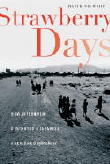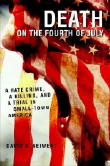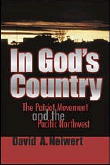Spyhopping the Right.

David Neiwert is a freelance journalist based in Seattle. He is the author of Strawberry Days: How Internment Destroyed a Japanese American Community (Palgrave/St. Martin's Press, June 2005), as well as Death on the Fourth of July: The Story of a Killing, a Trial, and Hate Crime in America, (Palgrave/St. Martin's, 2004), and In God's Country: The Patriot Movement and the Pacific Northwest (1999, WSU Press). His reportage for MSNBC.com on domestic terrorism won the National Press Club Award for Distinguished Online Journalism in 2000. His freelance work can be found at Salon.com, the Washington Post, MSNBC and various other publications. He can be contacted at dneiwert@hotmail.com.

Sara Robinson has worked as an editor or columnist for several national magazines, on beats as varied as sports, travel, and the Olympics; and has contributed to over 80 computer games for EA, Lucasfilm, Disney, and many other companies. A native of California's High Sierra, she spent 20 years in Silicon Valley before moving to Vancouver, BC in 2004. Her lifelong interest in the social effects of authoritarianism have most recently led her to pursue the MS in Futures Studies at the University of Houston. She's also a student member of the Association of Professional Futurists, and member of the Accelerated Studies Foundation advisory board on social and cultural issues. For fun, she raises kids and travels. You can reach her at srobinson@enginesofmischief.com.
Sara's recent series:
Cracks in the Wall: Parts I, II, and III.
Tunnels and Bridges: Parts I, II, III, and IV, plus a Short Detour.
Dave's recent series:
The March of the Minutemen
Intro: Parts 1, 2, 3, 4, 5, and 6.
Unhinged: Unhonest
Parts 1, 2, 3, 4, 5, and 6.
___
Other books by Dave [limited availability]:


"The Rise of Pseudo Fascism": An essay
Available in Adobe PDF format here
Support independent journalism:
Suggested $5 donation

Original posts: Part 1, Part 2, Part 3, Part 4, Part 5, Part 6, and Part 7.
______
Choice essays:
____
"The Political and the Personal"
____
"Bush, the Nazis and America":
Parts 1, 2, 3, and 4.
_______
Rush, Newspeak and Fascism: An Exegesis
[PDF file]
[Suggested $5 donation]
[In HTML: Parts I, II, III, IV, V, VI, VII, VIII, IX, X,, XI, XII, XIII, XIV and XV. See explanatory note.]
[Also available in HTML, and with art, at Cursor.]

_______
Orcinus Principium No. 1
Orcinus Principium No. 2
Why Orcinus?
|
|
| |
|
|
| |
|
|
|
|
|
|
| |
Talking about hate crimes
Tuesday, June 21, 2005
Well, as promised, I appeared this afternoon on Michael Medved's radio show on KTTH-AM in Seattle to talk about hate crimes. We used my book Death on the Fourth of July: The Story of a Killing, a Trial, and Hate Crime in America as a jumping-off point.
I was treated courteously throughout (Medved did have to prod me at one point when I was trying not altogether successfully to come up with a succinct way to make a point) and I thought the hour was well spent. Obviously, I didn't make a convert out of Medved, but I think I managed to clear up a lot of the myths about hate crimes that permeate the discussion.
The rush of a radio talk show often sweeps away more detailed points, and there was one case of this I thought I'd explain a little more here. I mentioned, during the show, that there was a recent story in the Philly Inquirer about a significant upsurge in white-supremacist activity in New Jersey. Many of the hate crimes being perpetrated as result of this trend were anti-Semitic crimes, ranging from assaults to vandalism. But there was another component: immigrants were probably being attacked in significant numbers, but were not reporting the crimes:
- Jews are hardly the only group that has felt the press of hate groups, many of which have been motivated by an influx of immigrants, experts say.
Last year, a pack of teens and young men called the East Coast Hate Crew attacked at least 10 Mexican men in Ocean County over a four-month period, investigators said. The beatings and robberies typically took place on streets late at night as the Mexicans were heading home from work.
Eight people were charged with the crimes. Officials suspected more attacks, said Christensen, the state investigator, but it was difficult to find victims because many would have been illegal immigrants.
"They were just getting beaten and walking home with their friends and not reporting this to the police," he said.
This points to one of the most significant reasons that hate crimes are underreported substantially in this country (as I said on the air, the Southern Poverty Law Center estimates that, in contrast to the 9,000 or so reported to the FBI annually, the actual figure is likely close to 40,000): a major portion of the unreported hate crimes involve attacks on immigrants. This trend has been increasing rapidly in the past year or two.
I explained some of this on pp. 168-169 of Death on the Fourth of July:
- Of all the factors that cause law-enforcement officers to fail to identify and investigate bias crimes, the most significant, the DOJ study's authors found, was the gap between the victims and the police. The less trust that exists between minorities and their local law enforcement, the greater the likelihood that hate crimes will go unresolved.
The Filipino family that encountered Chris Kinison and his friends in Ocean Shores was a textbook example of how hate crimes can go unresolved this way. Many of the victims spoke poor English and had difficulty communicating with the police officers who came to their rescue; even though some of them later reported that they had wanted to pursue harassment charges against the men, the officers either failed or refused to register this. And the officers, little trained in dealing with hate crimes, clearly did not recognize that they had come upon the scene of a felony, which in most other such cases would require a careful and serious investigation and specialized handling of the victims.
By seeming eager to simply break up the potential violence and send everyone on their respective ways—and particularly by escorting the family to the town's borders—the officers communicated to the victims the message that the harassment they had endured was insignificant. This in turn feeds the distrust that any outsider (particularly a minority) in a strange town is likely to feel.
Moreover, the incident vividly illustrates that the problem of letting hate crimes go unresolved extends well beyond the mere statistical issues, and that the stakes can be very high indeed, especially for small towns. The result, as it was in Ocean Shores, was that these crimes can escalate from simple harassment to outright violence. Perpetrators, as some studies have observed, see their escape from the arm of the law almost as an invitation to step things up.
Other studies have likewise observed that the most common cause of this cascade of crime is the failure of police to proactively bridge the gap between themselves and the victims. The JRSA's Joan Weiss, in earlier research, found that the reluctance of victims to report crimes was significantly higher for hate crimes than for other crimes. The DOJ study reiterates this point: "For a multitude of reasons, hate crime victims are a population that is leery of reporting crimes—bias or otherwise—to law enforcement agencies."
Most hate-crime victims are minorities in the communities where the crimes occur. In many cases, they have poor English skills and have difficulty asking for assistance; in others, they may simply be unaware that what has happened to them is a serious crime. This is particularly true for immigrants, who may be reluctant to even contact police because of their experience with law enforcement in their homelands, where corruption and indifference to such crimes are not uncommon. Likewise, hate-crime victims may be confused about or unaware of the bias motivation involved, interpreting a threat or assault as a random act when other evidence suggests it was not. At other times, they may be reluctant to tell police about the bias aspects of the acts against them, fearing the police won't believe them or that they simply won't do anything about it anyway. And in the case of gays and lesbians, many are reluctant to report the crimes out of fear they will be forced to reveal their own identities as homosexuals; many more fear (sometimes with good reason) that they will wind up being humiliated and victimized further by police.
Likewise, many minorities in certain communities—blacks in the South or Hispanics in the Southwest, for example—have long histories of built-up distrust of law enforcement in their communities, and may simply refuse to participate in an investigation without proactive efforts on the part of police to bridge that gap. Indeed, this level of involvement was almost unanimously the chief factor reported by advocacy groups when queried by the authors of the DOJ study about what most affected hate-crime victims' decision to call or cooperate with police.
Of course, I was going to explain all that in a sentence or two. Really.
I do like blogs better than talk shows, because, you know, if I stammer behind the keyboard, I can just erase it. But thanks to Medved for the courteous and rational conversation.
[I don't think either an archive or transcript of the conversation exists, sorry to report.]
9:30 PM
Spotlight
Bush World: Where science is fungible
Fresh on the heels of news storiesthat Bush administration officials tampered with government climate reports, this story in the Los Angeles Times just left me shaking my head:
- Land Study on Grazing Denounced
Two retired specialists say Interior excised their warnings on the effects on wildlife and water
It describes how Bush administration officials completely reversed the scientific findings of veteran experts en route to turning public lands into open range for ranchers:
- The Bush administration altered critical portions of a scientific analysis of the environmental impact of cattle grazing on public lands before announcing Thursday that it would relax regulations limiting grazing on those lands, according to scientists involved in the study.
A government biologist and a hydrologist, who both retired this year from the Bureau of Land Management, said their conclusions that the proposed new rules might adversely affect water quality and wildlife, including endangered species, were excised and replaced with language justifying less stringent regulations favored by cattle ranchers.
... The original draft of the environmental analysis warned that the new rules would have a "significant adverse impact" on wildlife, but that phrase was removed. The bureau now concludes that the grazing regulations are "beneficial to animals."
Eliminated from the final draft was another conclusion that read: "The Proposed Action will have a slow, long-term adverse impact on wildlife and biological diversity in general."
Also removed was language saying how a number of the rule changes could adversely affect endangered species.
"This is a whitewash. They took all of our science and reversed it 180 degrees," said Erick Campbell, a former BLM state biologist in Nevada and a 30-year bureau employee who retired this year. He was the author of sections of the report pertaining to the effect on wildlife and threatened and endangered species.
"They rewrote everything," Campbell said in an interview this week. "It's a crime."
You've just gotta love what those new regulations will do, too:
- The new rules, published Friday by the BLM, a division of the Department of Interior, ensures ranchers expanded access to public land and requires federal land managers to conduct protracted studies before taking action to limit that access.
The rules reverse a long-standing agency policy that gave BLM experts the authority to quickly determine whether livestock grazing was inflicting damage.
The regulations also eliminate the agency's obligation to seek public input on some grazing decisions. Public comment will be allowed but not required.
OK, a quick tally: negating scientific review, forcing public lands to accommodate private industry, reducing the ability of land managers to respond to land degradation, and then cutting out public participation. Could this possibly be any worse for the public?
Well, yes, because the rules reverse some real gains made in recent years in bringing public land use -- including that by ranchers -- to sustainable levels:
- In recent years, concerns about the condition of much Western grazing land has been heightened by drought, which has denuded pastures in the most arid areas, causing bureau managers to close some pastures and prompting ranchers to sell their herds.
The new rules mark a departure from grazing regulations adopted in 1995 under President Clinton and Interior Secretary Bruce Babbitt. Those regulations reflected the view of range scientists that a legacy of overgrazing in the West had degraded scarce water resources, damaged native plant communities and imperiled wildlife.
Babbitt ordered the bureau to establish standards that spelled out when public lands were open for grazing, and for the first time required range specialists to assess each pasture to ensure it held enough vegetation to support wildlife and livestock. It was the first time in about 50 years that the federal government had tried sweeping overhauls of how Western ranchers operated on public lands.
It would be like spitting into the wind, I suppose, to ask these ranchers where they think their grazing lands are going to come from when they've all been destroyed. But hey, that's someone else's long-term problem, isn't it?
It's certainly not the Bush administration's.
I come from ranching country and have written more range-management stories than I care to recall (it's not what you'd call glamor reporting). I thought I'd seen it all during the James Watt/Anne Gorsuch years, but the Bush gang really take the In Your Face Audacity prize. They're rewriting the management of public lands so that they are now no longer really belong to the public.
Just as disturbing is the consistency in the outright of abuse of scientific review for predetermined ends. At some point, you'd think people would figure out that our government is now in the hands of religious ideologues and corporate profiteers who see science as the enemy. As a nation whose superiority is built on technology that is built on science, that should trouble even conservatives.
[Via Thoughts From Kansas, which has a nice roundup of other atrocities on the endangered-species front as well.]
5:58 PM
Spotlight
Radio Free Orcinus
Monday, June 20, 2005
I'm venturing into hostile territory today, at the studios of the local right-wing talk-show station KTTH-AM in Seattle, where I'll be the guest on the Michael Medved show, which is nationally syndicated. If you have Medved on a local station, you should be able to catch it.
We'll be debating hate-crime laws and whether we should have them or not. We'll discuss my book Death on the Fourth of July: The Story of a Killing, a Trial, and Hate Crime in America, which is due out in paperback next month. (More on that later.)
Medved is opposed to the concept of hate crimes, so I'll be discussing that with him. This doesn't surprise me, incidentally; he's also made clear that he thinks anti-discrimination laws are wrong-headed (and, apparently, unconstitutional) as well. The constitutionality of bias-crime laws, as it happens, is predicated in several important regards on the precedent of those rulings that upheld anti-discrimination laws.
I typically avoid right-wing talk shows, especially in situations where the host is obviously hostile. Usually such appearances are simple muggings in which the guest is set up, ambushed, incessantly interrupted, and then browbeaten in the closing segment without any chance of rebuttal. It's not a fair game, and I'm not interested in playing.
But I listen to Medved's show irregularly, and my impression is that, though I may disagree with him, he avoids that kind of ugly setup for the most part. I say "for the most part" because I know that Mark Crispin Miller, in his appearance on Medved's show last summer, had exactly the kind of experience I describe as typical for other shows.
So I'll be reporting back here with my impressions.
Incidentally, you can listen to my interview with KDVS's Richard Estes and Ron Glick by going to his program's Web site and clicking on the link. It will, however, be available only for a week. That interview was about my most recent book, Strawberry Days: How Internment Destroyed a Japanese American Community.
11:30 PM
Spotlight
The real Minutemen
The media keep sending love letters to the Minutemen, this time in the form of a remarkably nearsighted Monterey Weekly piece that offered the following assessment:
- Indeed, it soon seemed that the hysteria over the armed and dangerous Minutemen was much ado about nothing. Retired men and women sitting on the backs of pickup trucks in six-hour shifts, concentrated along a two-mile stretch of border fence eyeing the vacant desert, appeared more like a group on a bird watching excursion than a paramilitary force.
The author of the piece, Andy Isaacson, thus blithely ignores one of the realities about dealing with organizations like the Minutemen: when they're posing in front of the cameras, they're very careful about what they say and how they appear. It's what they're doing and saying when no one is looking that is the problem.
I had a little experience with this in my dealings with a previous permutation of the militia movement -- from which, in fact, the border "patriots" are directly derived. The Washington State Militia, for instance, held public rallies and talked before the cameras about how they were just trying to be a "neighborhood watch" out to protect their fellow citizens. Behind closed doors, as we later learned, they were building pipe bombs and talking about blowing up railroad tunnels as well as their fellow citizens. (See In God's Country for more on this.)
The Minutemen's public face works exactly the same: Have your spokesmen work hard to present a sincere and concerned image of ordinary citizens who are just "fed up," while behind closed doors they let their hair down. The core of the Minutemen comprises a corps of True Believers from the extremist right. The leaders spout talk about the "war on terror" in public, but the followers mostly (in private, of course) spout talk about their neighborhoods and homes being "invaded" by criminal brown people.
A good example of this popped up in a recent story out of Tennessee involving a formative Minuteman operation there. Tennessee, of course, has no international border; and so its Minutemen, unsurprisingly, are focused on the "invasion" of Latinos from elsewhere:
- Before a meeting in Hamblen County Tuesday night, 6 News asked meeting leader Carl Whitaker if he's operating a hate group, like some people say.
"We're not a hate group. We're a concerned group. We're concerned what's happening," Whitaker says. "If people are here illegally and they want to get legal, we would be glad to try to help them follow through the process. We don't hate anybody."
He says the Tennessee Volunteer Minutemen are working to expose companies that hire illegal aliens and take jobs away from taxpaying Americans. "We've turned in five different places of employment here that are hiring illegals."
But another supporter told a different story. Off-camera, James Drinnon says there are more Mexicans than African-Americans in Hamblen County. But he didn't really say African-American. He used the "N" word.
On camera, Drinnon says, "I think they ought to get them all out. Most of them in here. That's where all the dope's coming from. Most of them's Hispanic."
That's pretty consonant with the expressions of support from the Minutemen we've seen in the comments section of this blog, isn't it?
It also resonates with a quote from another Minuteman I posted earlier:
- "We understand why Gilchrist and [project co-organizer Chris] Simcox have to talk all this P.C., crap," said one. "It's all about playing to the media. That's fine. While we're here, it's their game and we'll play by their rules. Once Minuteman's over, though, we might just have to come back and do our own thing."
The Minutemen keep promising us that they're just ordinary folks. Of, course, so do Ku Klux Klan members. And there's little mistaking the real presence of exactly the same kind of "citizens" throughout this merry band, forming its real, activist core.
Daryle Jenkins of One People's Project recently found a historical reason for that: Neo-Nazis have been talking about forming precisely this kind of "citizen's border patrol" for many years now. He has the video to prove it:
- Almost thirty years ago there was another group that basically our current vigilante xenophobes pattern themselves after. They weren't called the Minuteman Project then. They were the Klan Border Patrol, and it was what gave David Duke his first big break. This is an excerpt from a 1989 video titled The History of W.A.R., Pt. 1. For those who forgotten about this crew, W.A.R. stands for White Aryan Resistance, the group that Tom Metzger runs when he isn't going around California doing blues karaoke. He talks about the formation of the Klan Border Patrol back in Oct. 1977 and what it entailed.
They may hide behind masks -- whether made of white sheets or soothing PR. But we can see who they are well enough anyway.
11:10 PM
Spotlight
'A chance to invade'
Everyone is taking a stab at answering the question, "Why did we invade Iraq?" See, especially, Matt Yglesias' take, which points out that one of the real outrages in the memo is the utter lack of postwar planning it depicts.
Today, Russ Baker points out in Tom Paine.com that he reported back in October, in interviews with a former Bush speechwriter, that Bush actually had envsioned invading Iraq well before 9/11:
- "He was thinking about invading Iraq in 1999," said author and journalist Mickey Herskowitz. "It was on his mind. He said to me: 'One of the keys to being seen as a great leader is to be seen as a commander-in-chief.' And he said, 'My father had all this political capital built up when he drove the Iraqis out of Kuwait and he wasted it.' He said, 'If I have a chance to invade . . . .if I had that much capital, I'm not going to waste it. I'm going to get everything passed that I want to get passed and I'm going to have a successful presidency."
The mainstream press dismissed the stories and essentially ignored them. However, the Downing Street Memo only confirmed what Herskowitz was describing.
At times, I think even the talk about PNAC and the Bush Doctrine is something of a smokescreen when it comes to explaining why we invaded Iraq. It is clear, after years of observing him in action, that George W. Bush's style of leadership consists of finding data and evidence to confirm his preconceived notions. He adopted the PNAC and Iraqi National Congress folks because they were saying what he wanted to hear.
And invading Iraq was what he wanted to hear because that was his vision for his presidency from the get-go. Of course, it is a vision drenched in Oedipal rivalry and crude power-mongering, using war as a pretense for a broader political agenda.
Which is, of course, exactly what we got.
2:29 PM
Spotlight
|
|
| |
|
|
|